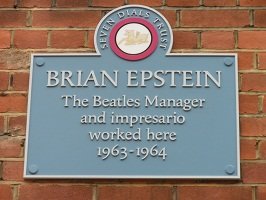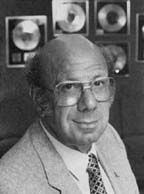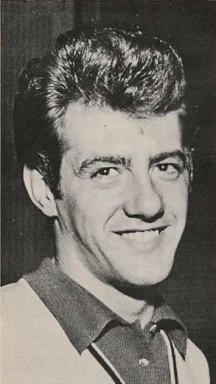Apologies for the inevitable delays …life gets in the way of good intentions! Anyway, we left Tony Barrow as he was about to join Brian Epstein’s NEMS Organisation.
We were trying to find an office and Epstein wanted cheap premises because he was used to Liverpool rentals, not London W.1. and he got Dick James into the picture by asking advice about office space. Dick James said ‘There’s a little office down Monmouth Street, a tiny little back street by Seven Dials. There’s a first floor office becoming vacant – Joe ‘Mr Piano’ Henderson is coming out of there.’ Epstein, Dick James and I trooped down there, didn’t see Joe Henderson, but it was furnished Joe Henderson style complete with very low lighting and a casting couch! The first thing I did when I moved in was to get strip lighting!


(Above, the plaque marking 13 Monmouth Street, and Dick James)
In the first few months all your record company links were with EMI?
Yes. It was The Beatles, Gerry & the Pacemakers, Billy J. Kramer & the Dakotas, The Dakotas on their own, The Fourmost, Sounds Incorporated (who were a superb backing back if nothing else) and Cilla. Cilla, Brian had been talking about all through the summer of 1963. I actually opened that one-and-a-half room above a dirty bookshop, 13 Monmouth Street on May 1st, 1963. Right through that summer he kept talking about this marvellous girl singer that he’d got. Just like The Beatles were going to be bigger than Elvis, this girl was going to be Judy Garland. ‘Wait ’til you hear her – she’s Judy Garland all over again,’ he would say to me. The first view I got of Cilla was a back view of this massive carrot-coloured beehive towering towards the ceiling, accompanied by Bobby Willis. I saw the back view of them arriving in the outer office. When I heard her I had to say yes, there was definitely something there. What was interesting about Cilla at the time was that she could go all the way from being a husky voiced ballad singer into doing something like Dancing in the street. She made quite an interesting singer with a heavy brassy band behind her. Of the others, I suppose the ones that fared worst were The Fourmost. They should have done more than they did, but they were half a comedy group, and comedy doesn’t come over on record in that kind of way. It had to be out and out comedy like the stuff George (Martin) had been recording prior to The Beatles.

Can you recall what Syd’s (Gillingham, then the EMI head of press) reaction was to having an outside man involved?
I was starting from scratch, like Epstein had been. Epstein had not done management before – he’d been a seller of records only. I had not done PR, but I had been pitched, so I thought I knew how to do it. I won’t say I didn’t have respect for record company press offices, but I think I tended to use record companies (and initially that meant EMI) like people have used them more recently, that is as distributors. You know how the era of the independent producer was, where the whole thing was packaged and given to the superb distribution machine called EMI or whatever, and I took the initiative from the start by demanding to be the central control. I didn’t do this is a dogmatic way – I was happy to work with record company PR’s whom I’d lately been working with as a reviewer, but I insisted everything be centralised through me. Later I did that with BBC TV and ATV. We used the BBC with the Cilla shows, to lay out money for promotion, but I took complete control of the PR. I’m not saying this is a dictatorial way and I don’t think it was resented by Syd Gillingham and his people, one of whom was Bess Coleman, and Pat Pretty came to EMI I think after Syd left. It was all totally amicable on the grounds that the record company press offices had umpteen releases to take care of and were very pleased to have one or two taken off their hands. The likes of Max Clifford might say years later ‘I represented The Beatles’ but at the time he and his colleagues were only too happy to say to callers ‘No, if it’s about The Beatles, speak to Tony Barrow – he’s on Covent Garden 2332 (that was the number)’. When there was to be a launch for one of the new Epstein artists, or taking some press to a gig somewhere, they (the record companies) were the ones who would pay for it, but we would organise it. So I didn’t take anything away from them that they were unwilling to give away – they were only too pleased to be given the biographies and pictures and the bill from Dezo Hoffman. That worked fine – they were overworked. Those were the days when record companies were interested in maintaining careers, so they were glad to have something taken off their hands.

Syd Gillingham and Max Clifford
There were 20 or 25 singles a week
The whole thing was was totally different because it was singles that mattered. The moment it looked like Please please me was going to hit number one, and then it did, they immediately rushed the act into the studios, get an album as soon as possible, or, having got four or five tracks already in the can, one of which was going to be the next single, just make it up to ten. That’s why a lot of (LP’s) are so mean – it was only ten instead of twelve (tracks) because they couldn’t pull any more together in the time. The hit single came and then they would release an album. If you were the opposition company (i.e. one for whom the artist had previously recorded) you would quickly put out a Best of..
Now they invest money into the album immediately
The be all and end all was the single.When we are talking about key things The Beatles brought about, they caused an acceleration in the record business by doing things like not putting singles on the album….encouraging album sales. Half the time I don’t think record companies had co-ordinated directly with artists’ management in the same way that Epstein did with EMI. EMI would say ‘we need the next single by September 1st’ and Epstein would say ‘No, we want it on October 4 because I’ve got an Arthur Howes tour starting the last week of September and we want the first six dates under our belts, then we want the single out. I want a chance to get Top of the Pops and Thank Your Lucky Stars to be in the can before we go out on tour. The televisions will break during the first two weeks of the tour which will a) sell records and b) sell concert tickets.’ For the first time, cohesion between all parties and there was a business plan. The record company for the first time was only party to it instead of being in complete control.
Epstein learned quickly and his greatest skill was to hire the right people. He hired an excellent guy to do the bookings, an excellent guy to produce the artists for their television appearances. He went to the right lawyers, accountants and so on. Because he knew so little, if he’d been part of the Grade family he’d have done what the Grade family did, but he came to it totally new and therefore went to people. He made mistakes, the classic example being with one of the early TV dates, say it was Sunday Night at the London Palladium. He went along to whichever Grade it was involved in the booking and negotiated that The Beatles would be top of the bill and they said ‘OK, £1000’ (or whatever the figure was). Epstein said ‘I’ll have to come back to you tomorrow on that; pencil the dates in and include the other three TV dates. You’re saying £1,000 for the Palladium and £500 for the others. I’ll have to come back to you tomorrow.’ What he really went to do was the get on the phone very quickly to David Jacobs the lawyer, and ask if that was OK. Meanwhile overnight the Grade office would be saying ‘we want The Beatles for these dates, and we want Cilla; give him another 50% on top.’ And before he got back to them in the morning they’d be on to him with a new offer and Brian would say ‘OK, done!’ They were getting the wrong impression but he (Epstein) was relying on what David Jacobs said.

There was the odd act – I can only remember Tommy Quickly – who went elsewhere, not EMI. Had EMI turned them down?
Brian was trying to spread his interests around. Ray Horrocks – was he at Pye? I think he was a man that Brian knew, or he had been bidding for other acts and got Quigley (his real name). Quickly into the charts at 101 and quickly out again! I think that was very much Brian’s heart ruling his head. He may have fancied Tommy Quickly’s chances as well as fancying Tommy Quickly, but it was the first of a number of mistakes he made for varying reasons. In that case it was plain and simply that Tommy Quickly was a pretty boy and he fancied him. He was probably getting to the stage then when he believed in his own Midas touch. He started to add artists on a whim. There was one time when he went down to the West Country to judge a competition and before he’d judged any of the acts he made a typically flamboyant speech saying he would arrange a recording contract for the winner. The winners were The Rustiks.

They, and another one, Michael Haslam – he’d worked in a leather tannery, God knows what he’s doing now?

Michael Haslam, (1939-2003)
Each time he’d say things like ‘these are following in the footsteps of..whoever.’ He never did it with Cilla – he never signed another girl and said ‘this is going to be the new Cilla.’
Beryl Marsden wasn’t his?
No – should have been. She’s actually improved over the years. Beryl Marsden was potentially a Barbara Dickson.
At NEMS you took on Brian Mulligan? (former Philips press officer and later editor of Music Week)
Brian Mulligan, Keith Howell (formerly CBS press office), Pat Pretty (formerly EMI & Pye) – that was much later, Bob Houston (former Melody Maker journalist) – that was later, for a year until I couldn’t stand the spilt beer stains on the carpet, Norman Duval, Maureen O’Grady…
To be concluded!
Text ©David Hughes 2016, photos borrowed for illustration only via Google search.

Hi there, I’d love to speak to David Hughes, if you wouldn’t mind contacting me, about a project I’m researching. I can be contacted via my website janinehjones.com – thank you!
LikeLike
Parlophone did have sporadic pop hits under
Martin pre-Beatles by Jim Dale, The Cougars,
Vipers, Shane Fenton, The Temperance Seven,
Keith Kelly(ex-JB7), and others – rejecting
Tommy Steele however was a big misstep.
It was not for lack of trying, as many commendable releases
such as those by The Scorpions, the pre-Glitter
Paul Raven, Eric Ford, Jerry Lordan, The Packabeats
Vince Taylor, et al put paid to the notion that
Parlophone was a poor quality label of last resort.
To be sure, Adam Faith‘s run of top pop hits (assigned to
Parlophone by Newell after having earlier passed through HMV
and Rank with apparently no room at the Columbia inn)
as well as leased RGM/Stigwood tracks (Mike Sarne,
in the Joe Brown vein) must have rankled Martin.
One question for you , why was Gerry assigned to Columbia
vs. Parlophone like most of the NEMS mob?
Most of Columbia’s 1961 era hitmakers were still going strong
at that point.
LikeLike
The truth is, I have no idea. My guess would be that Parlophone, Columbia and HMV all had their own promotion teams (pluggers) and, particularly as Gerry & Pacemakers were Brian’s only other group (?) they stood a better chance being worked by the Columbia team.
LikeLike